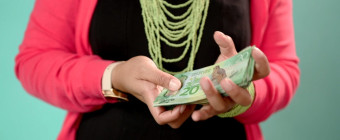KiwiSaver



Planning & budgeting
Saving & investing
KiwiSaver
Tackling debt
Protecting wealth
Retirement
Home buying
Life events
Setting goals
Money tracking
Plan your spending with a budget
Getting advice
Studying
Get better with money
What pūtea beliefs do you have?
How to save your money
How to start investing
Find a financial adviser to help you invest
Your investment profile
Compound interest
Net worth
Types of investments
Term deposits
Bonds
Investment funds
Shares
Property investment
How KiwiSaver works and why it's worth joining
How to pick the right KiwiSaver fund
Make the most of KiwiSaver and grow your balance
How KiwiSaver can help you get into your first home
Applying for a KiwiSaver hardship withdrawal
How to use buy now pay later
Before borrowing
How to get out of debt quickly
Credit reports
Know your rights
Pros and cons of debt consolidation
Credit cards
Car loans
Personal loans
Hire purchase
Student loans
Getting a fine
What happens if I start to struggle with moni?
How to protect yourself from fraud and being scammed
About insurance
Insurance types
Insuring ourselves
Wills
Enduring powers of attorney
Family trusts
Insuring our homes
Losing a partner
Redundancy
Serious diagnosis
How to cope with the aftermath of fraud
Separation
About NZ Super
This year's NZ Super rates
When you’re thinking of living in a retirement village
How to plan, save and invest for retirement
Manage your money in retirement
Find housing options in retirement
Planning & budgeting
Saving & investing
KiwiSaver
Tackling debt
Protecting wealth
Retirement
Home buying

KiwiSaver

Budgeting

KiwiSaver

Budgeting

Women

Women

Women

Budgeting


Resources
Help with the cost of living
Just wondering
In need of financial help
Booklets
Glossary
Videos
Blogs
View all
1 February 2019
Reading time: 3 minutes
Posted
by
Priscilla Dickinson
, 3 Comments

As a single woman in my 30s, I’d had enough of renting. My home-buyer’s checklist was a small lock up and go, close to the city. In early 2006, I bought a freestanding cottage in Orakei, pouring all my savings into the deposit. While doable, the repayments weren’t a walk in the park.
Having the one income, I settled on a bog-standard, two-year fixed-interest home loan rate over 25 years. Part of the bank’s welcome package was a credit card with a $5,000 limit, interest-free for the first 12 months. I wasn’t sure I’d use it but decided to take advantage of the (seemingly) free finance.
I started using the card for small, frivolous purchases: Friday night drinks, a weekend brunch and shouting the odd coffee. As my spending was scattered, I saw each purchase in isolation – $10 to $20 each time didn’t seem like much.
As the balance crept upward, my card became my back-stop. I had access to spare money and up to a year before thinking about paying it back. Time flew, and after eight months I’d racked up the full $5,000. A lifeline suddenly cut, it was difficult to change how I lived.
When 12 months rolled around, fees seemed to appear thick and fast. A $20 account fee tipped my balance over the limit, triggering a $20 over-limit fee. I found myself trapped in a cycle of paying the minimum balance (often late, with a $20 penalty applied), only to find myself a little short before next payday and redrawing on the debt.
In desperation, I took a second job. I’d come home to multiple boxes stacked at my door, spending evenings folding circulars. It was tiring work for small change, and I developed a swollen wrist to boot.
The extra money helped, but progress was slow. Feeling under pressure, I ultimately decided to put my house on the market. After one year of grappling with interest and fees, I repaid the card and cancelled it.
When I discussed a new home loan pre-approval with the bank, their response was that due to account conduct, I had to wait until my credit rating improved. I’d paid around $6,200 for the $5,000 “interest-free” card (125%), including interest and account and late payment fees.
Finance approval has never been so easy, but it’s not just about the numbers stacking up. If you’re a regular saver and live within your means, a credit card can support your financial situation by covering expenses while offsetting income against a home loan.
If you’re using a card to bridge the gap between paydays or fund last-minute Christmas gifts, it’s critical to consider the full cost – and your resources – to pay it back.
In my experience, it’s easier – and significantly cheaper – to practise patience and cultivate regular saving habits, even for small amounts. There’s no greater feeling than to buy or give someone something knowing you’ve truly earned it.
Priscilla Dickinson has 14 years’ experience in the insurance industry and is a freelance writer. Her blog is at justaminutemama.co.nz.
5 steps to get your $521
1 Comment
Who’s teaching your daughter (or niece, or granddaughter) about money?
1 Comment
My Money Sorted: Hilary Barry
2 Comments
My Money Sorted: Ben
3 Comments
My Money Sorted: Daniel
1 Comment
8 ways to hack Christmas when you’re stretching the budget
6 Comments

Use verification code from your authenticator app. How to use authenticator apps.
Code is invalid. Please try again
Don't have an account? Sign up
Or log in with our social media platforms


A Sorted account gives you a personal dashboard where you can save your tools, track your progress and you'll also receive helpful money tips and guidance straight to your inbox.



Comments (3)
Comments
26 March 19
Credit cards are a devil to clear yourself from. When I went to refinance my home and was told I had to cancel my card, I changed banks. I asked for another credit card at the new bank, they said wait 6 months so I only got a eftpos card at the new one. I have found this freeing as I can't spend what I don't have and I can't online shop til I drop, saving me money as well. If I want to get something online, my brother lets me use his debit card if I give him the money first so I have to have the funds to get it to begin with.
15 March 19
Totally misleading headline - she didn't lose her house.
6 February 19
Peti @ The Leveraged Mama
I can totally relate to this situation - credit card spending is slightly ‘detached’ from normal spending, we can treat it like ‘free’ money which is really crazy.
No one has commented on this page yet.
RSS feed for comments on this page | RSS feed for all comments